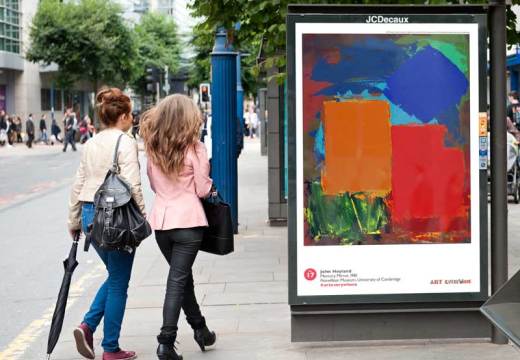From Martin Gayford’s interview with Gilbert & George, in the July/August issue of Apollo:
‘We always said that London was the centre of the universe,’ George reflects, ‘that it was the most typical planet Earth place. No one believed us in the ’70s, ’80s and ’90s. Now everyone agrees.’ I remember Gilbert & George saying exactly this, and it did indeed once seem – like much that they proclaim – challengingly paradoxical. And, as with so many of their paradoxes, they pushed it just a little bit further: the epicentre of everything, they seem to imply, is chez G&G.
The strange thing is they have a point. Twenty-five or 30 years ago, London itself seemed more than a touch provincial in comparison with, say, New York, but Gilbert & George were not content with claiming global centrality for the metropolis of London. They insisted that the district where they themselves happened to live – Spitalfields, adjacent to Whitechapel, Bethnal Green and the City of London – was the true omphalos: the most representative spot in the modern world. It was there that I went to visit them in the early 18th-century house in which G&G have lived since the 1960s.
‘If a spaceship arrived,’ George suggests, ‘and the Martians said we’ve got three minutes to film planet Earth, where is the most typical place? We always said they should visit Liverpool Street Station. The whole world comes here. It’s extraordinary.’ At this point Gilbert puts in: ‘Everything which is going to happen, is happening here!’
In a way, it is. Within a few minutes’ walk of G&G’s front door on Fournier Street, one can witness the mega-wealth of the financial markets; the waifs and strays on the steps of Hawksmoor’s great baroque Christ Church; the debris of urban nightlife; and the clash of fundamentalist belief with secularism in the post 9/11 era. G&G encounter all of these as they walk around their neighbourhood. That is the subject, in a sense, of all their work – and certainly of the epic cycle of Scapegoating Pictures, which they have just completed. […]
The new Scapegoating Pictures are – like almost everything G&G have produced for decades – elaborately layered and reworked photo-collages. And, as always, this time the effect is a bit different from the hundreds of pictures that they have produced over the last four decades. G&G themselves are staple presences in their art, but in these pictures they have frequently been shredded, reduced to ribbons, so that they look skeletal or like medieval straw men. ‘It is not just us, it’s pieces of us,’ Gilbert says. ‘Cut into pieces, exploded, to turn ourselves into spirits: the spirit of the city.’ […]
The imagery in the Scapegoating Pictures, as often in G&G’s work, is derived from the streets around their house. A ubiquitous feature is bomb-shaped canisters that in reality contain not explosives, but nitrous oxide. Laughing gas, George quotes, has a street name of ‘sweet air’ or ‘hippy crack’, and is ‘recreationally inhaled to induce euphoria, hallucinations and uncontrollable laughter’. G&G, he goes on, ‘were out every morning at 6 o’clock, for one year, picking up the “bombs” in the back streets before the sweepers came’. Then he adds a characteristic observation: ‘They were normally found with human excrement and orange peel around them – we never found out why.’ […]
Squalor has always been a G&G trademark: drunkenness, obscene graffiti, bodily fluids, their own turds – all these have featured in pictures, along with trees, flowers and idyllic landscape. The Wildean line about lying in the gutter but looking at the stars fits them well.
This is an extract from the July/August issue of Apollo. Click here to buy the current issue.
‘Gilbert & George: Scapegoating Pictures for London’ is at White Cube, Bermondsey, from 18 July–28 September 2014.

















![Masterpiece [Re]discovery 2022. Photo: Ben Fisher Photography, courtesy of Masterpiece London](http://zephr.apollo-magazine.com/wp-content/uploads/2022/07/MPL2022_4263.jpg)
‘Like landscape, his objects seem to breathe’: Gordon Baldwin (1932–2025)